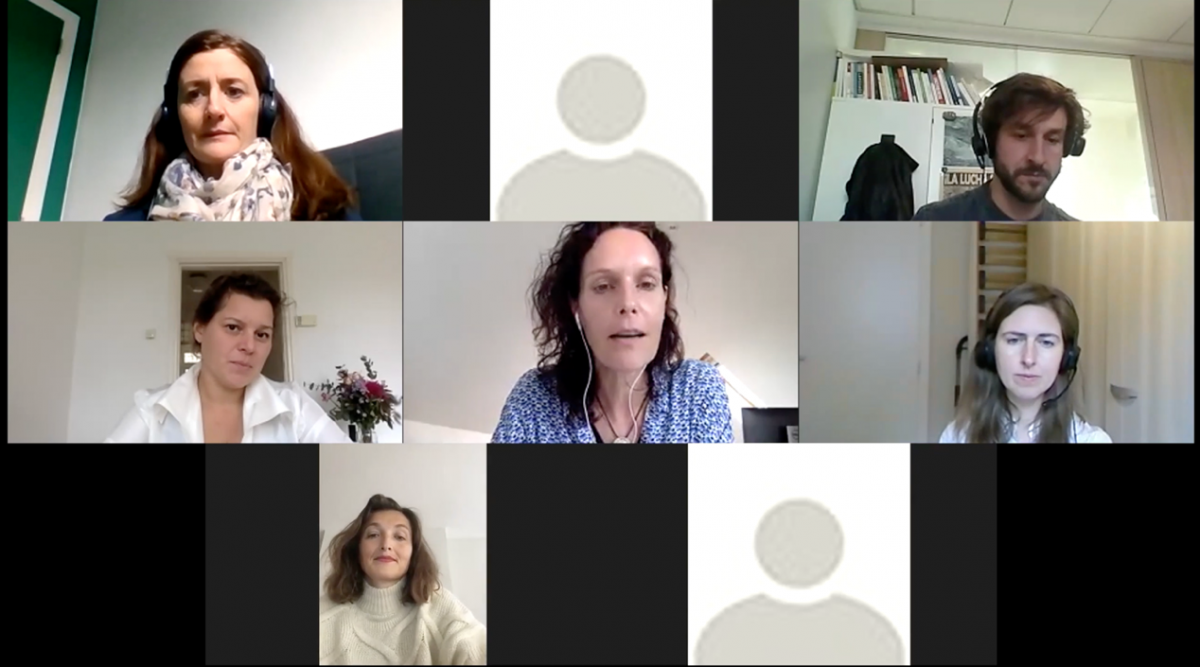European Green Week event highlights opportunities for building back better with nature-based solutions
Nature-based solutions can help to bring life and integrity back to damaged ecosystems to improve wildlife habitats, protect soils and watersheds, support economic resiliency, and better confront a changing climate. The Wildlife Conservation Society (WCS) and the International Union for Conservation of Nature (IUCN) jointly hosted a virtual European Green Week partner event on 16th October on building back better with nature-based solutions.

Photo: IUCN - (From top to bottom, left to right): Janice Weatherley-Singh, Zacharie Mechali, Erica ten Broeke, Hilde Eggermont, Cha
This webinar, which was moderated by Ms Hilde Eggermont, Coordinator of the Belgian Biodiversity Platform/BiodivERsA Vice Chair, engaged government, scientists and civil society representatives in a panel discussion. The panellists shared knowledge and ideas that inspire action to upscale nature-based solutions in Europe and globally, including as part of green recovery plans being developed in response to the global COVID-19 pandemic.
Ms Chantal van Ham, EU Programme Manager Nature-based Solutions at IUCN, emphasised that: ‘we need to increase awareness and understanding of nature-based solutions to address the twin crises of climate change and biodiversity loss and ensure that they are integrated in recovery plans. The European Green Deal states that all EU policies should contribute to preserving and restoring Europe’s natural capital, but it will only lead to the desired outcomes if the protection of biodiversity, restoration of ecosystems and a stable climate are integrated across sectoral policies, in land management, in business development and in financing.’
Ms Elena Visnar Malinovska, Head of Unit - Climate Adaptation at the European Commission DG CLIMA, made a strong plea for stepping up adaptation methods, mentioning that the new EU Adaptation Policy aims to deploy innovation and adaptation at scale with a strong focus on forestry and agriculture. She added that better monitoring and reporting on ecosystems in the recovery actions and systemic policy responses are needed for the ‘climate proofing of nature’ in both agricultural and urban areas.
Ms Erica ten Broeke, Landscape Manager at Commonland, initiator, catalyst and enabler of large-scale and long-term restoration initiatives, showed an inspiring example of how landscapes can be restored, providing economic return while halting desertification and erosion through a holistic partnerships approach. She highlighted the work of partner organisation AlVelAl in Spain, which focuses on the regenerative business for almond production in the semi-arid steppe of Altiplano Estepario in the south of Spain, co-creating a landscape vision through a unique stakeholder engagement process.
Dr Janice Weatherley-Singh, Director – EU Strategic Relations, WCS EU, explained in her presentation that most ecologically intact places are outside Europe and that ecosystems with high ecological integrity have high intrinsic value in terms of resilience, biodiversity, human health, Indigenous cultures, carbon stocks and sinks, and regional climate protection, among others. She added that protecting intact forests is critical as these forests and ecosystems can provide 30% of the climate change solution to 2030. However, only 40% of forests globally have high integrity and this is declining.
Mr Zacharie Mechali, Senior Advisor/Deputy of the Department of Ecological Transitions and Natural Resources, Agence Française de Développement (AFD), concurred that the climate and biodiversity convergence are important to promote nature-based solutions but that currently only a shocking 2% of our global climate financing has a positive impact on biodiversity. Maintaining functioning ecosystems and their ability to render climate services is a necessity in the 1.5°C scenario, alongside a strong decarbonisation effort. AFD commits 30% of its climate finance in favour of biodiversity by 2025 and this will create the necessary traction for the doubling of the Group's direct contribution to biodiversity, from 0.5 billion € in 2019 to 1 billion € by 2025.
In their concluding remarks, IUCN and WCS reiterated that this dialogue will be continued, as it is important to jointly address the twin crises of biodiversity loss and climate change by integrating nature-based solutions into the heart of the recovery plans.
The recording of the webinar is accessible at: https://vimeo.com/469759755
For more information, please contact: Janice Weatherley-Singh, e-mail: jweatherleysingh@wcs.org or Chantal van Ham, e-mail: Chantal.vanham@iucn.org
